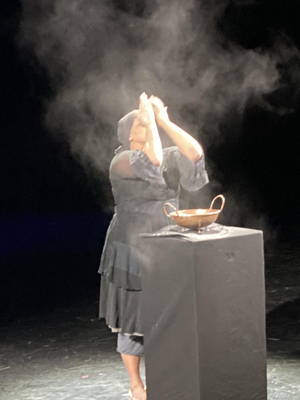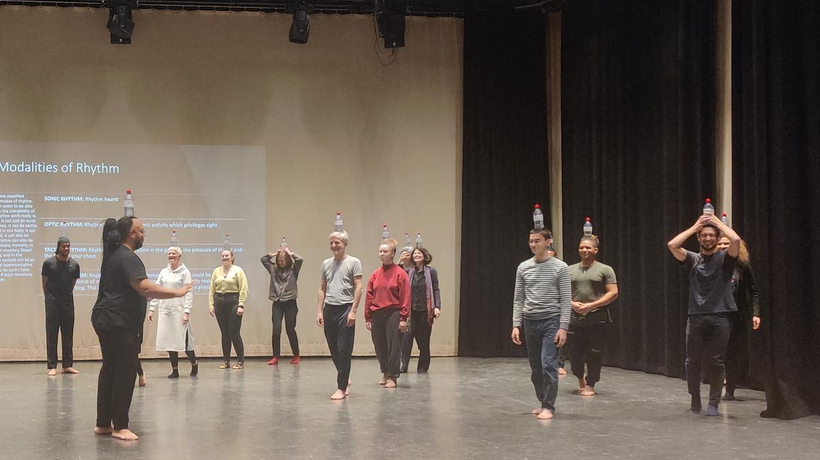Impression of Unlearning Language 12 March 2022

To kick off ‘Unlearning Language’ with the Artists in Residence Farida Nabibaks and Suzan Tunca, we gathered in the Danstheaterzaal at the Academy for Theatre and Dance. As Suzan Tunca explained in her introduction, the day was dedicated to question or reverse the common hierarchical relation between mind and body.
Not to exclude the mind, or the word, but to start from the body and to see what we can learn, understand and express listening to and working with the body. To get into that, the group joined Suzan on the stage for a breathing exercise based on the movement method Double Skin/Double Mind and then Farida took over the stage with her performance Traces of Time, dealing with the corporeal memories of slavery.
Three workshops
Next, the group was split up into three, to work either with Farida and Suzan, or with one of the two other artists Farida and Suzan had invited: Dayna Martinez Morales (https://framerframed.nl/en/mensen/dayna-martinez-morales/) and Thomas Talawa Presto (https://tabankadance.com/about-us/artistic-director/). With Farida and Suzan, the group worked among others on connecting movement to their experience of Farida’s performance in combination with Double Skin/Double Mind principles. With Dayna the focus was on ‘authentic movement’, while with Thomas (and his two collaborators) the emphasis was on de-colonizing non-Western dance traditions, and on re-discovering the original knowledge shared through them.
Symbolic lunch
For lunch, Maureen de Jong, had prepared another amazing dish, dealing with colonialism, which she accompanied by reading a beautiful text about nutmeg (see below). Lunch was also a moment for all to be together and exchange experiences of the different workshops, while towards the end, everyone was invited to listen to the recording of the poem that was made during the previous Saturday on Unlearning the Human. (See the impression page on Unlearning the Human for links to the sound files.)
After a lecture on documenting the intuitive body of dance at ICK by Suzan, the three workshops continued in the afternoon. At the end, we all came together again in de Danstheaterzaal to watch and participate in the presentations of the different subgroups.

An almost slavish power of attraction on people
A forgotten tribute to nutmeg
You will probably know me best as a powder. Or from those bags of veined nuts or yellowed mace in the back of your spice rack. The lion’s share of my life’s journey has had nothing to do with people. Jungle life is about fighting for every sunbeam. Keeps you busy if you’re nailed to the ground. Break off a twig or cut into my bark and I bleed. What I mean to say is: my sap is red. I use it to bind and disinfect my wounds. And I make my own insecticide, myristic acid. I believe you’re fond of its taste, though it is a poison to protect me from insects and moulds. If you lot eat enough of it, you’ll hallucinate too. Believe me. I reproduce. You’re familiar with the story of the birds and the bees, aren’t you? Only in my case, most of the pollen is carried to the stigma by beetles. I lure them with the scent of my flower. After a successful pollination it takes around nine months for the fruit to grow fully. How long does that take with you? My fruit changes from green to light-yellow in that phase, and bursts open: splits lengthways down the middle. Then, in the pale-yellow fruit, the crimson mace appears. I lure the birds with that colour. I call them. Come, fly to me and eat my children. And the birds come.
Megapodes, hornbills and endless variations of pigeon. The imperial pigeon for instance. His call is deep and thundering like a wild animal. He is bluish-white, his wings and tail are metallic green and gold with reflections of violet and blue. His legs are coral red and his beady eyes golden yellow. The Dutch call that bird the grey nutmeg dove. Sometimes the Dutch aren’t easy to understand. Perhaps they’re right after all when they say they don’t see colour? I have no greater pleasure than watching one of those birds gulping down my fruit; nut, mace and all. Spreading my seed over the whole archipelago. If my fruit were to fall on the ground next to me, we’d only come to grief over sunlight, minerals and water. People call me Pala or gozora or tow-kow. And when the Europeans too discover me thousands of years later, I get names like Nuez Moscado, Nootmuskaat or Nutmeg. All meaning fine-scented nut in their languages. I command an almost slavish power of attraction on people, as do my peers, peppers, cloves and cinnamon, to name but a few. Their whole history, full of perilous ocean voyages, bloody battles, slavery and colonial domination: it was, to a large extent, all about us. Our scent and flavour.
The Portuguese, Spanish, and later the English and the Dutch, came with ships of war and trade. The Europeans are so captivated by my spices that they compete for the monopoly of my fruit. They are convinced that it is God’s gift to them. And as it pleases God to let them work for his gifts, and therefore hides the glistening stones, the red metal and other treasures deep in the bowels of the earth, so he planted me on an archipelago on the very outer corner of the Eastern Ocean to tempt men into daring voyages. That’s what the Europeans think. And they don’t seem to consider – or maybe couldn’t care less – that people live on those most outer of island outposts. People for whom the islands are the centre of the world. People who I have been living with for thousands of years.
Monologue written by Maureen de Jong (https://kleinkookbedrijf.nl/) for Koken voor Tjampakka | a theatrical and gastronomical music performance for Keti Koti 2021 | in collaboration with Veenfabriek | based on the work of botanist and biologist N. Peeters













